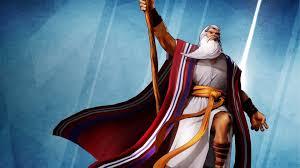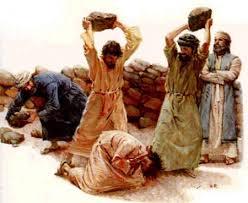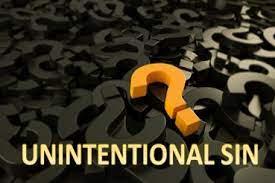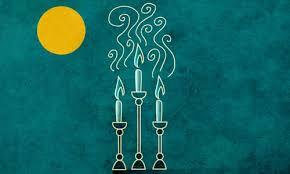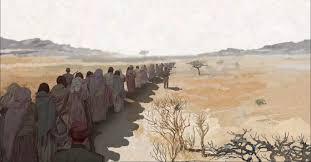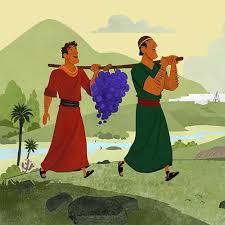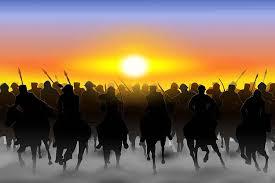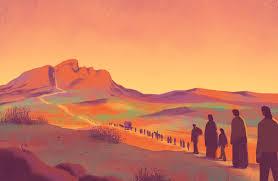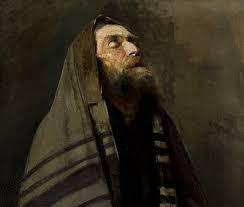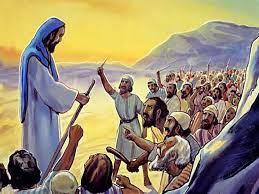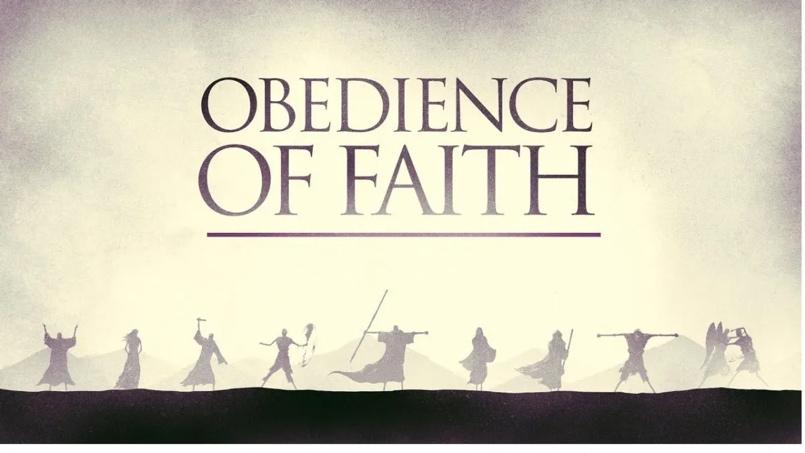Fb – மறைந்திருக்கும் பொக்கிஷத்தின் உவமை மத்தேயு 13:44
மறைந்திருக்கும் பொக்கிஷத்தின் உவமை
மத்தேயு 13:44
மறைந்த புதையல் டிஐஜியின் உவமை: முத்துவின் உவமையுடன் இந்த உவமை ஜோடி எப்படி? ஒவ்வொரு உவமையும் யாரைக் குறிக்கிறது? எப்படி? வேதாகமத்தில் அதை எங்கே காணலாம்? புதையலைக் கண்டுபிடித்தவன், புதையல் மறைத்து வைத்திருப்பதைத் தெரிந்து கொண்டு வயலை வாங்கியபோது ஏதாவது ஒழுக்கக்கேடான செயலைச் செய்தானா? ஏன்? ஏன் இல்லை? ADONAI இஸ்ரவேலுடன் முடிக்கப்படவில்லை என்பதை நாம் எப்படி அறிவது? இதுவரை படித்த ஆறு உவமைகளில் நீங்கள் என்ன சிந்தனை ஓட்டத்தைக் காண்கிறீர்கள்?
பிரதிபலிக்கவும்: யேசுவா ஹா’மேஷியாக் மீது நாம் நம்பிக்கை வைக்கும்போது, ஒரு ஆன்மீக யுரேகா தருணம் வருகிறது. அந்த தருணத்தை யூத நண்பருடன் பகிர்ந்து கொண்டீர்களா?
மறைக்கப்பட்ட பொக்கிஷத்தின் உவமையின் ஒரு முக்கிய அம்சம் என்னவென்றால், கோட்பாட்டு சிதைவுடன் கூட,
மீதியானோர் இஸ்ரவேலிலிருந்து காப்பாற்றப்படுவார்கள்.
மூன்றாவது ஜோடி மறைந்திருக்கும் பொக்கிஷம் (இஸ்ரேல்) மற்றும் முத்து (புறஜாதிகள்) ஆகியவற்றின் உவமைகளால் ஆனது, இது விரோதத்தின் பிளவு சுவர் உடைக்கப்பட்டதைக் காட்டுகிறது (எபேசியர் 2:14-18) மற்றும் யூதர்கள் மற்றும் புறஜாதிகள் ஒன்றாக உருவாக்குகிறார்கள். கண்ணுக்கு தெரியாத உலகளாவிய தேவாலயம். இயேசு இப்போது கலிலேயா கடலோரத்தில் ஒரு கூட்டத்திற்கு முன்னால் இல்லை, ஆனால் பேதுருவின் வீட்டில் அவருடைய டால்மிடிமுடன் தனியாக இருக்கிறார்.
1867 ஆம் ஆண்டு தென்னாப்பிரிக்காவில் ஒரு பண்ணையில், பதினைந்து வயதான எராஸ்மஸ் ஜேக்கப்ஸ் சூரியனில் ஒரு கல் மின்னுவதைக் கண்டார். பிரகாசிக்கும் பாறை இறுதியில் ஒரு பக்கத்து வீட்டுக்காரரிடம் தெரிவிக்கப்பட்டது, அவர் அதை குடும்பத்தினரிடமிருந்து வாங்க விரும்பினார். அதன் மதிப்பை அறியாத ஈராஸ்மஸின் தாய் பக்கத்து வீட்டுக்காரரிடம், “நீங்கள் விரும்பினால் கல்லை வைத்துக் கொள்ளலாம்.” இறுதியில், ஒரு கனிமவியலாளர் கல்லை 21.25 காரட் வைரமாகத் தீர்மானித்தார் மற்றும் வெளிப்படையாக அதிக மதிப்பைக் கொண்டிருந்தார். யுரேகா என்ற கிரேக்க வார்த்தைக்கு நான் கண்டுபிடித்தேன் என்று அர்த்தம் என்பதால், இது “யுரேகா வைரம்” என்று அறியப்பட்டது. விரைவில் ஜேக்கப்ஸ் பண்ணைக்கு அருகில் உள்ள வயல் மதிப்பு உயர்ந்தது. நிலத்தின் அடியில் இதுவரை கண்டுபிடிக்கப்பட்ட வைர வைப்புகளில் ஒன்று. கடவுளின் ராஜ்யத்தின் ஒரு பகுதியாக இருப்பதன் மதிப்பு ஒரு பொக்கிஷம் போன்றது என்று மேசியா கூறினார்.714
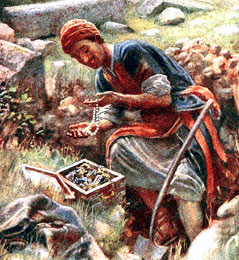 இன்னும் வீட்டின் உள்ளே (இணைப்பைக் காண Ez – The Private Parables of the Kingdom in House), இயேசு தொடர்ந்து கற்பித்தார்: பரலோகராஜ்யம் ஒரு வயல்வெளியில் மறைத்து வைக்கப்பட்டிருக்கும் பொக்கிஷம் போன்றது. கோதுமையும் களைகளும் விளக்கப்பட்ட உவமையில், யேசுவா ஏற்கனவே வயல்வெளியை உலகைக் குறிக்கும் வகையில் விளக்கியிருந்தார். ஒரு பொக்கிஷத்தை குறியீடாகப் பயன்படுத்தினால் அது இஸ்ரவேலைக் குறிக்கிறது என்று TaNaKh நமக்குச் சொல்கிறது: இப்போது நீங்கள் எனக்கு முழுமையாகக் கீழ்ப்படிந்து என் உடன்படிக்கையைக் கடைப்பிடித்தால், எல்லா நாடுகளிலிருந்தும் நீங்கள் என் பொக்கிஷமான உடைமையாக இருப்பீர்கள் (யாத்திராகமம் 19:5). ஏனென்றால், நீங்கள் உங்கள் கடவுளாகிய ஆண்டவருக்குப் பரிசுத்தமான மக்கள். பூமியின் முகத்திலுள்ள எல்லா ஜனங்களிலிருந்தும் தம்முடைய சொந்தப் பொக்கிஷமாக உங்கள் தேவனாகிய கர்த்தர் உங்களைத் தேர்ந்தெடுத்திருக்கிறார் (உபாகமம் 14:2 CJB). கர்த்தர் யாக்கோபைத் தமக்குச் சொந்தமாகவும், இஸ்ரவேலைத் தமது பொக்கிஷமான சொத்தாகவும் தேர்ந்துகொண்டார் (சங்கீதம் 135:4).
இன்னும் வீட்டின் உள்ளே (இணைப்பைக் காண Ez – The Private Parables of the Kingdom in House), இயேசு தொடர்ந்து கற்பித்தார்: பரலோகராஜ்யம் ஒரு வயல்வெளியில் மறைத்து வைக்கப்பட்டிருக்கும் பொக்கிஷம் போன்றது. கோதுமையும் களைகளும் விளக்கப்பட்ட உவமையில், யேசுவா ஏற்கனவே வயல்வெளியை உலகைக் குறிக்கும் வகையில் விளக்கியிருந்தார். ஒரு பொக்கிஷத்தை குறியீடாகப் பயன்படுத்தினால் அது இஸ்ரவேலைக் குறிக்கிறது என்று TaNaKh நமக்குச் சொல்கிறது: இப்போது நீங்கள் எனக்கு முழுமையாகக் கீழ்ப்படிந்து என் உடன்படிக்கையைக் கடைப்பிடித்தால், எல்லா நாடுகளிலிருந்தும் நீங்கள் என் பொக்கிஷமான உடைமையாக இருப்பீர்கள் (யாத்திராகமம் 19:5). ஏனென்றால், நீங்கள் உங்கள் கடவுளாகிய ஆண்டவருக்குப் பரிசுத்தமான மக்கள். பூமியின் முகத்திலுள்ள எல்லா ஜனங்களிலிருந்தும் தம்முடைய சொந்தப் பொக்கிஷமாக உங்கள் தேவனாகிய கர்த்தர் உங்களைத் தேர்ந்தெடுத்திருக்கிறார் (உபாகமம் 14:2 CJB). கர்த்தர் யாக்கோபைத் தமக்குச் சொந்தமாகவும், இஸ்ரவேலைத் தமது பொக்கிஷமான சொத்தாகவும் தேர்ந்துகொண்டார் (சங்கீதம் 135:4).
இந்த உவமை இஸ்ரவேலிலிருந்து காப்பாற்றப்படும் ஒரு எஞ்சியிருக்கும் என்று போதிக்கிறது, மர்ம இராச்சியத்தின் காலத்தில் யூதர்கள் மேசியாவிடம் வருவார்கள். ஒரு மனிதன் அதைக் கண்டுபிடித்து, அதை மீண்டும் மறைத்து, மகிழ்ச்சியுடன் சென்று, தன்னிடம் இருந்த அனைத்தையும் விற்று, அந்த வயலை வாங்கினான். ஹலகாவின் கூற்றுப்படி, புதையல் குறிக்கப்படாமல் பொது நிலத்தில் காணப்பட்டால், அது கண்டுபிடித்தவருக்கு சொந்தமானது. குறிக்கப்பட்டிருந்தால், உரிமையாளரைத் தேட வேண்டும். கண்டுபிடிக்கப்பட்டது இயற்கையானதாக இருந்தால் (தங்கக் கட்டி அல்லது வைரம்) அல்லது தனியார் நிலத்தில் குறிக்கப்படாமல் இருந்தால், அது நிலத்தின் உரிமையாளருக்கு சொந்தமானது; அதனால்தான் கண்டுபிடிப்பாளர் அந்த புலத்தை வாங்கினார் – புதிய உரிமையாளராக ஆக.
ஆனால், அந்த வயலைக் கண்டுபிடித்தவர் “முன்புதையல்” விலைக்கு வாங்கினார் என்பதையும், புதையல் இருப்பதை உரிமையாளர் அறிந்திருந்தால், அவர் அந்த விலைக்கு வயலை விற்றிருக்க மாட்டார் என்பதையும் உவமை உணர்த்துகிறது. இது ஒரு நெறிமுறைக் கேள்வியை எழுப்புகிறது: புலத்தை வாங்குவதற்கு முன் புதையலின் உரிமையாளருக்குத் தெரிவிக்க ஹலாக்கா அல்லது அறநெறி (உண்மையில் அது வேறுபட்டால்) மூலம் கண்டுபிடிப்பாளர் கடமைப்பட்டிருக்கிறாரா? இல்லை. சொத்து எப்போதும் உரிமையாளர்களுக்குத் தெரிந்ததைத் தாண்டிய திறனைக் கொண்டுள்ளது; ஆண்டவனுக்கு மட்டுமே எல்லாம் தெரியும். ஒரு உரிமையாளர் தனக்குச் சொந்தமானவற்றால் வழங்கப்படும் வாய்ப்புகளை விசாரிக்க முடியும், மேலும் மற்றவர்கள் தனது அறிவை அதிகரிப்பதில் தங்கள் நேரத்தை ஆக்கிரமிக்க வேண்டிய கட்டாயம் இல்லை. வேறு வார்த்தைகளில் கூறுவதானால், உரிமையாளர் தனது சொந்த சொத்தின் நிலையை அறிய பொறுப்பு. எனவே, உங்கள் நிலத்தில் எண்ணெய் இருப்பதாக நான் அறிந்தால், அதை வாங்க முன்வரும்போது அந்த உண்மையை நான் உங்களுக்குத் தெரிவிக்க வேண்டிய அவசியமில்லை, ஏனெனில் உரிமையானது என்னை விட உங்களை நீங்களே கண்டுபிடிக்கத் தூண்ட வேண்டும். இந்தக் காணியை விற்பவர் தனக்குத் தெரிந்த ஆற்றலைக் கொண்டு தனது நிலத்திற்கு நியாயமான விலையைப் பெற்றார்; பெரும்பாலும் நடப்பது போல, புதிய உரிமையாளர் கூடுதல் திறனை உணர்ந்ததால் அதை வாங்கினார்.715
பொக்கிஷம் அவர் வசம் வருவதில்லை, புதையல் இருக்கும் இடம்தான். அவருடைய மரணத்தின் மூலம் இயேசு உலகம் முழுவதையும் விலைக்கு வாங்கினார், இஸ்ரவேலரே உலகத்தில் பொக்கிஷம். இதன் விளைவாக, பல யூதர்கள் கிருபையின் போது யேசுவா ஹா-மேஷியாச்சில் விசுவாசிகளாக மாறுவார்கள் (ஹீப்ரூஸ் Bp – தி டெஸ்பென்சேஷன் ஆஃப் கிரேஸ் பற்றிய எனது விளக்கத்தைப் பார்க்கவும்).716
உண்மையில், இஸ்ரவேல் உலகம் முழுவதும் புதைக்கப்பட்டிருக்கிறது. யூதர்களின் மிகப்பெரிய மக்கள் தொகை இஸ்ரேலில் இல்லை, ஆனால் நியூயார்க் நகரில் உள்ளது. மேலும் யூத மக்கள் உலகம் முழுவதும் சிதறிக் கிடக்கின்றனர். ஆனால், ADONAI இஸ்ரவேலுடன் ஒரு தேசமாக இல்லை. ரபி ஷால் எழுதினார்: அப்படியானால், நான் சொல்கிறேன், கடவுள் தம் மக்களை நிராகரித்துவிட்டாரா? சொர்க்கம் தடை! ஏனென்றால், நான் இஸ்ரவேலின் மகன், ஆபிரகாமின் சந்ததியிலிருந்து, பென்யமீன் கோத்திரத்திலிருந்து வந்தவன். கடவுள் முன்கூட்டியே தேர்ந்தெடுத்த தம் மக்களை நிராகரிக்கவில்லை. . . (ரோமர் 11:1-2a).
சகரியா எழுதினார்: நான் தாவீதின் வீட்டாரின் மேலும் யெருசலேமில் வசிப்பவர்கள் மேலும் கிருபையின் ஆவியையும் ஜெபத்தையும் ஊற்றுவேன்; அவர்கள் குத்தின என்னையே பார்ப்பார்கள். ஒருவன் ஒரே மகனுக்காகப் புலம்புவதைப் போல அவருக்காகப் புலம்புவார்கள்; முதற்பேறான மகனுக்கு ஏற்பட்ட கசப்பைப் போல அவர்கள் அவர் சார்பாக கசப்புடன் இருப்பார்கள் (வெளிப்படுத்துதல் Ev – இயேசு கிறிஸ்துவின் இரண்டாம் வருகைக்கான அடிப்படையைப் பற்றிய எனது விளக்கத்தைப் பார்க்கவும்).
எரேமியா தீர்க்கதரிசி பல பத்திகளில் இஸ்ரயேல் மக்களை மீண்டும் ஒன்று சேர்ப்பதைப் பற்றியும், ஹாஷேம் அவர்களைத் தங்கள் சொந்த நாட்டிற்குத் திரும்பக் கொண்டு வருவதைப் பற்றியும் பேசுகிறார். அந்த காலம் இன்னும் எதிர்காலம். கடவுள் அவர்களை மீட்டெடுக்கும் போது, எந்த மத விடுமுறையையும் விட நீண்ட காலமாக கொண்டாடப்பட்ட எகிப்தில் இருந்து அவர்கள் பெற்ற அதிசயமான விடுதலையை கூட அவர்கள் மறந்துவிடுவார்கள் (ஏசாயா Dd – ஓநாய் ஆட்டுக்குட்டியுடன் வாழும் எனது விளக்கத்தைப் பார்க்கவும்). YHVH இஸ்ரவேல் தேசத்துடன் இல்லை, இந்த உவமை அந்த உண்மையை மிகவும் தெளிவாக்குகிறது.717
நாம் பார்த்த ஒன்பது உவமைகள் சிந்தனையின் அடிப்படை ஓட்டத்தை உருவாக்குகின்றன: (1) மண்ணின் உவமை (Et) சர்ச் காலம் முழுவதும் நற்செய்தி விதைக்கப்படும் என்று கற்பிக்கிறது. (2) சுயமாக வளரும் விதையின் உவமை (Eu) நற்செய்தி விதை ஒரு உள் ஆற்றலைக் கொண்டிருக்கும், அதனால் அது தானாகவே உயிர்ப்பிக்கும் என்று கற்பிக்கிறது. (3) கோதுமை மற்றும் களைகளின் உவமை (Ev) உண்மையான விதைப்பு தவறான எதிர்-விதைப்பால் பின்பற்றப்படும் என்று கற்பிக்கிறது. (4) கடுகு விதையின் உவமை (Ew) காணக்கூடிய சர்ச் அசாதாரணமான வெளிப்புற வளர்ச்சியை எடுத்துக் கொள்ளும் என்று கற்பிக்கிறது. (5) புளிப்பின் உவமை (Ex) காணக்கூடிய தேவாலயத்தின் கோட்பாடு சிதைக்கப்படும் என்று கற்பிக்கிறது. (6) மறைந்திருக்கும் புதையலின் உவமை (Fb) கோட்பாட்டு சீர்கேட்டுடன் கூட, இஸ்ரவேலிலிருந்து ஒரு மீதியானவர்கள் காப்பாற்றப்படுவார்கள் என்று கற்பிக்கிறது.



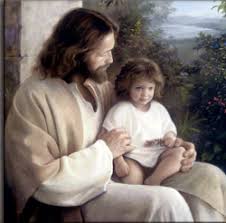 तब उस ने बालक को गोद में लेकर उन से कहा,
तब उस ने बालक को गोद में लेकर उन से कहा,  उन्होंने पतरस से मछुआरे के रूप में अपनी नौकरी पर वापस जाने के लिए कहा। उसने कहा:
उन्होंने पतरस से मछुआरे के रूप में अपनी नौकरी पर वापस जाने के लिए कहा। उसने कहा: 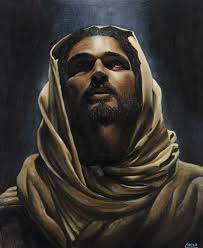 वे उसे मार डालेंगे
वे उसे मार डालेंगे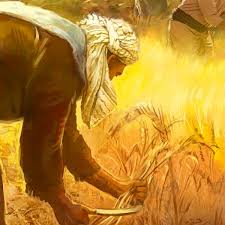 அந்த மாலையில்
அந்த மாலையில் 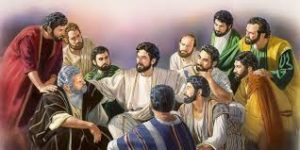 அவர் திரளான மக்களைக் கடற்கரையோரம் இறக்கிவிட்டு பேதுருவின்
அவர் திரளான மக்களைக் கடற்கரையோரம் இறக்கிவிட்டு பேதுருவின்